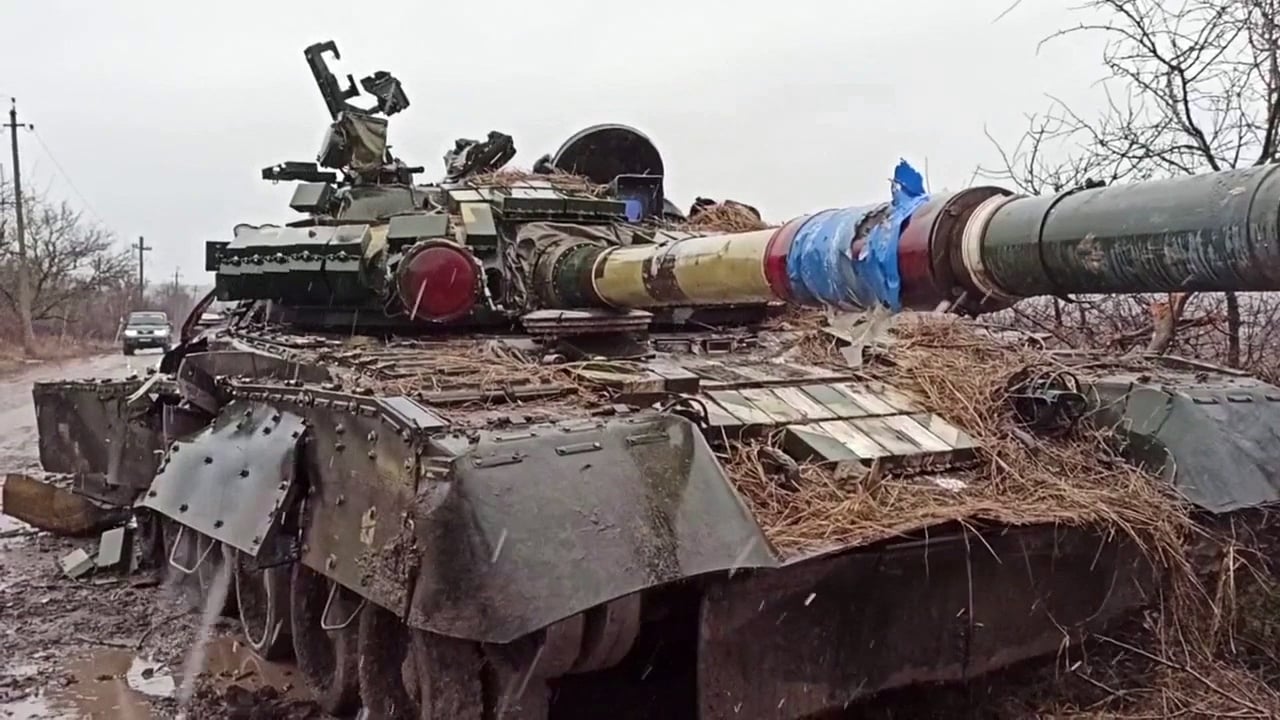The West’s sanctions against Russia could be the EU’s Abilene Paradox

This screen grab obtained from a handout video released by the Russian Defence Ministry on March 4, 2022, shows a destroyed Ukrainian army tank in the settlement of Gnutovo outside Mariupol.PHOTO/AFP
What you need to know:
- Thus, the West’s financial and economic sanctions on Russia could have severe unintended economic ramifications for the EU if they went full throttle on a trip to “Abilene”.
Whether it was a fable or a fact, Prof Jerry Harvey’s Abilene Paradox was epoch-making for offering an instructive lesson on how groupthink yields boomerangs.
Coined in 1974, the Abilene paradox was used to explain the contradiction between a group choice by a family and the unintended consequences for the family members at an individual level.
On a hot, sunny Sunday in 1974, a family of four adults made a decision, en masse, to travel from Coleman, Texas, to Abilene, Texas. Although not in anyone’s pressing interest, all family members decided to go on a 53-mile road trip to Abilene on account of the boredom in Coleman that each one knew was putative. Ostensibly, dining out in Abilene would compensate for their “boredom”.
Yet, the road to Coleman was supremely dusty and bumpy and the Sunday was baking hot. The dine out in Abilene did not ease their situation either because the food was extremely unsavoury. When they returned to Coleman after a long, daunting road trip, not a single person was happy and Prof Harvey, with a tinge of sarcasm, provoked a conversation in hindsight saying “it was a good trip, wasn’t it?”
Harvey hadn’t realised that like he, none had even wanted to go on the hot Sunday afternoon on a bumpy, dusty road to Abilene until every last one of them opened up upon their return. He hadn’t known that like him, each had embraced an idea they knew was not in their interest but which each one was afraid to reject because none wanted to let the group down and be the outlier.
Abilene-like paradoxes still exist. As stated in the beginning, the West has imposed on Russia, en bloc, economic and financial chokeholds following its military aggression on Ukraine.
As part of the coordinated Western action to starve the Russian economy of billions of additional euros from the sale of additional gas to Europe, Germany has withheld an operational licence for the Nord Stream 2 (Russian gas pipeline built to increase the volume of Russian gas to Western Europe).
The West has also “short-circuited” certain Russian banks from the SWIFT international financial payment system, sanctioned the Russian central back, sanctioned President Putin and Foreign Minister Lavrov, sanctioned Russian businessmen close to Putin or the Oligarchs as the Western Media refers to them and seized their Yachts, and banned Russian airliners and private jets from Western countries, among others.
At present, the Western allies continue to import Russian oil and gas but are contriving a scheme to stop the importation altogether.
Whereas the economic and financial sanctions will be devastating to the Russian economy in ways that Russia has never before experienced (and Putin has tacitly acknowledged so, calling the sanctions “an act of war” on Russia), they will be a double-edged sword, cutting both the victim and perpetrators.
Already, Russia’s economy has suffered from financial ostracisation, yet it continues to rake in 350 million euros daily from the EU countries alone.
The Russian economy will suffer even more should the EU act on the proposal to ban the importation of all Russian oil and gas in coordination with the US, UK, and Canada, but so will the EU states, which are handsomely entangled with Russia economically—thanks to their fair dependency on Russian gas and oil of up to 40 per cent.
Banning the importation of gas by the EU countries would mean the bloc will have to scour for alternative sources, which would be difficult or extremely expensive for them. The net effect for Europe would be higher costs of production and higher prices of goods and services and slow economic growth.
While the US imports some Russian oil (only about 3 percent of its total oil imports), it has a lot of flexibility with Russia because it doesn’t depend so much on Russian oil and gas, nor do Canada and the UK.
The US and Canada have their own oil reserves they can turn to and the UK already imports much of its oil from the US and Norway.
Thus, unlike the US, Canada and the UK, which are minimally entangled with Russia, the EU states are firmly detained by Russian oil and gas.
Apart from the fact that the EU’s economy is already hurting from higher energy prices due to the sanctions on Russia, the EU countries would suffer even more if Russia retaliated and withheld or cut back its gas and oil supplies.
Whether that is likely or not is not axiomatic—it’s not self-evident.
Yet, the EU states would pay a heavier price from gas shortages and high energy prices while the US would profit even more because it would fill the gap by exporting more liquified natural gas to the EU, albeit at a higher cost for the EU countries.
Thus, the West’s financial and economic sanctions on Russia could have severe unintended economic ramifications for the EU if they went full throttle on a trip to “Abilene”.
Accordingly, given differentials within the Western alliance, each state should evaluate its choices in light of its unique situation rather than jump on the Western bandwagon to Sanction Russia.
Patrick Barasa, Researcher at the Security Studies and Analysis Centre, Nkumba University




